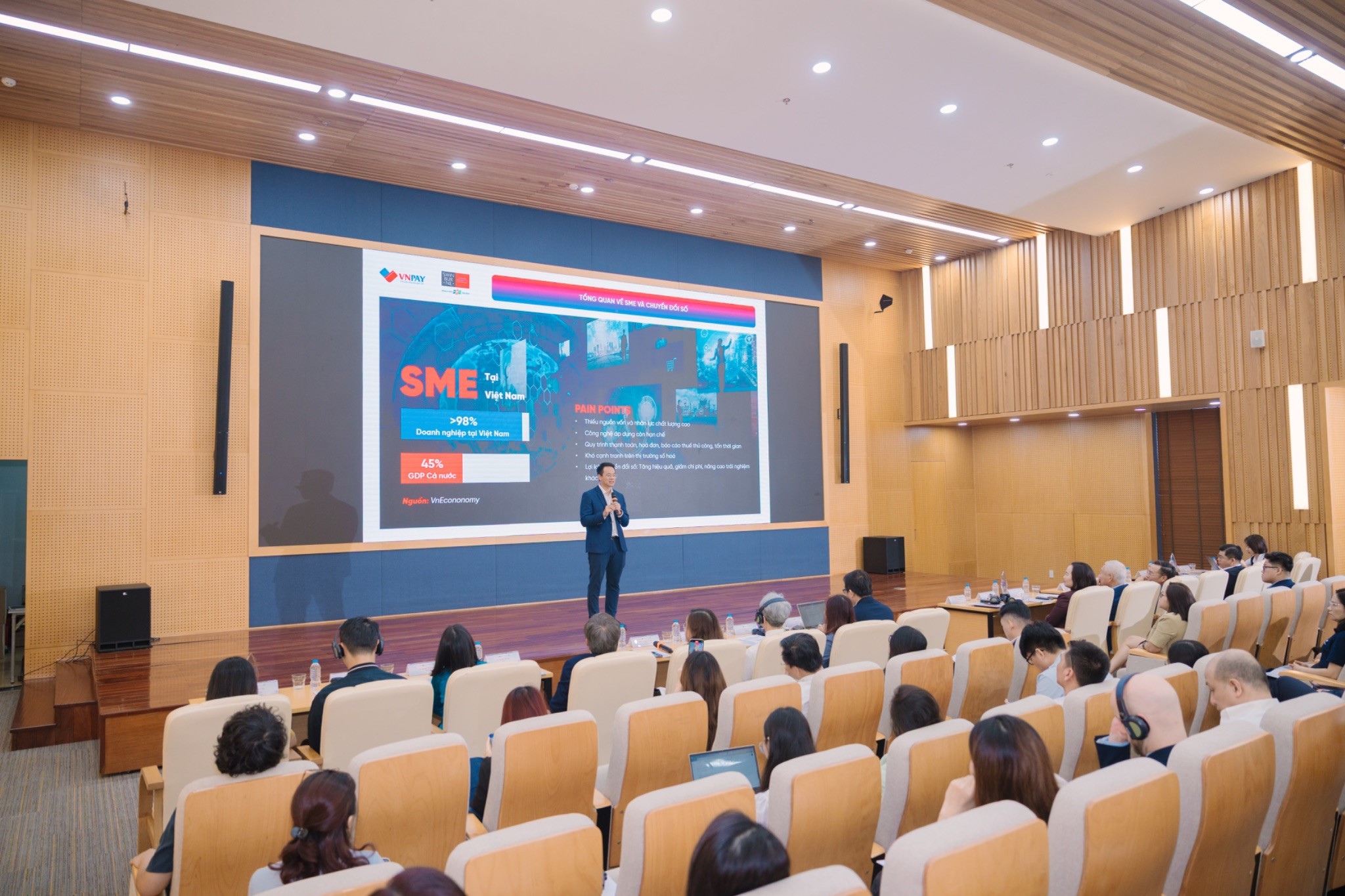The "Fintech 2025 - Digital Finance Strategy for Businesses" conference, hosted by Swinburne Vietnam in Hanoi, brought together experts from financial institutions, banks, educational organizations, and policy-making bodies. The speakers focused on discussing digital finance trends and a range of modern financial technology solutions.
The event aimed to update attendees on new trends and propose practical solutions to support Vietnamese businesses in adapting to the widespread digital transformation.
In his opening remarks, Doctor Hoang Viet Ha, Director of Swinburne Vietnam and Chairman of the conference, shared that Fintech 2025 brings together a comprehensive ecosystem in the financial sector, from financial institutions and policy advisory institutes to universities and the student community.
"This is a space for connection and collaboration to build and promote the development of Vietnam's digital finance industry," he added.
 |
Dr. Hoang Viet Ha, Director of Swinburne Vietnam & Chairman of the Conference, delivers the opening speech at Fintech 2025. Photo: Swinburne Vietnam |
Dr. Hoang Viet Ha, Director of Swinburne Vietnam & Chairman of the Conference, delivers the opening speech at Fintech 2025. Photo: Swinburne Vietnam
The key topics presented at the conference revolved around the application of technologies such as artificial intelligence (AI), blockchain, and big data analytics in finance and business administration. Experts affirmed the role of a comprehensive digital financial ecosystem in helping businesses, especially small and medium-sized enterprises (SMEs), enhance management capacity, optimize costs, and expand investment opportunities.
Associate Professor Doctor Dimitrios Salampasis, Head of the FinTech Department at Swinburne University of Technology (Australia), presented on "Finance 2.0 Trends Globally and Prospects in Vietnam". He emphasized the role of data and AI in financial transformation, particularly through open banking and other emerging technologies.
"AI accounts for the largest proportion of Fintech investment deals. In other words, AI in finance is being prioritized," he said, while also highlighting sustainable finance (ESG) and embedded finance as trends shaping the future of the industry.
 |
The conference attracted numerous experts from businesses and banks. Photo: Swinburne Vietnam |
The conference attracted numerous experts from businesses and banks. Photo: Swinburne Vietnam
From the perspective of a solution provider, Doctor Tran Manh Nam (VNPAY) outlined the challenges faced by SMEs, such as lack of capital, shortage of qualified personnel, manual processes, and difficulties in digital competition. He introduced VNPAY's ecosystem of digital solutions, including QR payments, SmartPOS, e-invoices, digital signatures, and automated tax reporting. These solutions help businesses increase revenue, reduce costs, operate efficiently, and comply with regulations.
Meanwhile, Nguyen Huu Hieu, Co-founder and CEO of Fiingroup, emphasized the role of data in financial management. According to him, the flow of data and information is the most important flow. He encouraged SMEs to effectively exploit internal data through the "5 Whys" technique to trace root causes. The presentation also introduced the golden rules for exploiting internal and external data.
In addition, Nguyen Thi Ngoan, Chief Financial Officer of MISA and CEO of Jetpay, also shared insights into the digitization of accounting and financial processes, integrating real-time data to optimize costs, increase transparency, and enhance decision-making capabilities.
 |
Experts discussed trends and the overall picture of the digital finance industry. Photo: Swinburne Vietnam |
Experts discussed trends and the overall picture of the digital finance industry. Photo: Swinburne Vietnam
From the banking sector, Doctor Henry K. Lam, Senior Director of Techcombank's Corporate Digital Banking Division, addressed the digital financial transformation for SMEs through regional trade trends, supply chains, and sustainable development. He introduced solutions such as digital loans, financial leasing, trade finance, open banking, BaaS, and the P2P Lending sandbox.
Regarding human resource training, Associate Professor Doctor Pham Thi Lien, Training Director of Asia University Vietnam, emphasized the boom in Fintech leading to a demand for digital finance professionals. She pointed out the gap between university education and practical requirements, proposing collaboration between universities and businesses to train high-quality personnel.
The rapid development of digital finance is reshaping business operations and profoundly changing the requirements for professionals in the field. At the conference, in addition to technology, experts discussed training and human resource development.
The event also introduced the Finance training program at Swinburne Vietnam and Asia University Vietnam as a model for technology-oriented, practical financial training. This approach is expected to bridge the gap between academia and the market.
Promoting collaboration between universities, businesses, and policy-making bodies is a practical solution to ensure both the quantity and quality of human resources in the current period of strong digital transformation.
(Source: Swinburne Vietnam)












